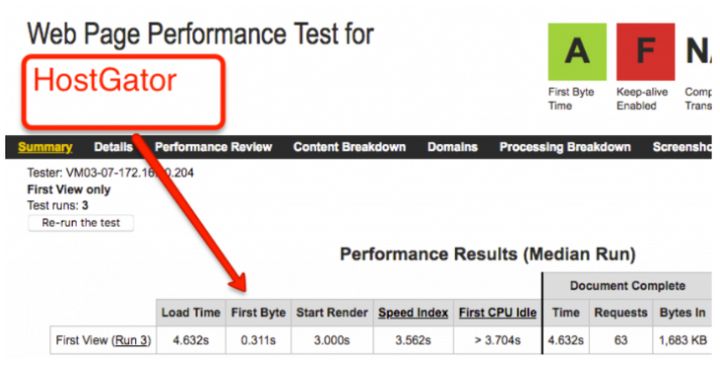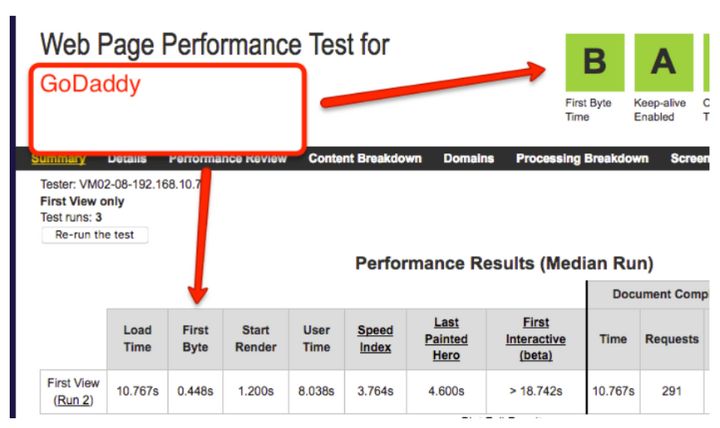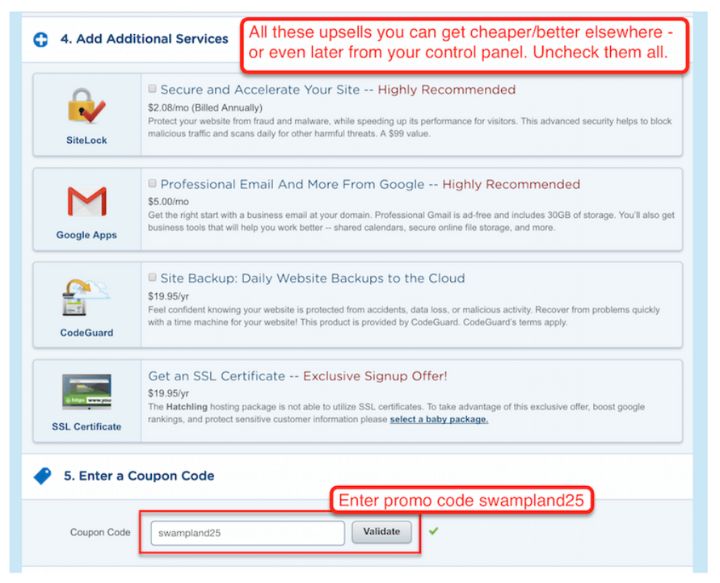GoDaddy and HostGator are two of the largest web hosting brands in the world. And they are owned by two of the largest web services companies in the world (GoDaddy Group and Newfold Digital). I’ve written separate HostGator and GoDaddy reviews, respectively.
They are both “go-to” brands for business owners looking for accessible, affordable hosting. And yet – they are different companies with different strengths and weaknesses. And when you need a website host, you have to make a decision.
I have had clients who use (and like) GoDaddy hosting. And although this site runs on InMotion Hosting – I also have several projects that have run on HostGator for years. I’ve been happy with them.
In this comparison between GoDaddy and HostGator, I’ll try to break down the differences ranging from pricing to customer service and market focus so that you can decide which is the best fit for your project.
Comparison Summary
| My Review | HostGator Review | GoDaddy Review |
|---|---|---|
| My Rating | 9/10 | 7.5/10 |
| Promotion | Get 65% Off | Get A .COM For Only $11.99 |
| Cheapest Plan | $2.75/mo. | $5.99/mo. | Uptime Guarantee |
| Money Guarantee | 30 days | 30 days |
| Free Domain | ||
| Free SSL | ||
| Free Website Migration | ||
| Learn More | Learn More |
HostGator vs. GoDaddy Pricing
HostGator and GoDaddy offer a wide range of hosting products, including Cloud hosting, specialized WordPress hosting, reseller hosting, etc. But for this comparison, we’ll focus on the most common hosting product – shared Linux hosting.
GoDaddy and Hostgator web hosting plans and pricing aren’t perfectly aligned. GoDaddy has four different plans, while Hostgator only has three.
HostGator Shared Hosting Plans
| Plan | Hatchling | Baby | Business |
|---|---|---|---|
| Initial Price* | $2.75/mo. | $3.50/mo. | $5.25/mo. |
| Renewal Price | $11.95/mo. | $12.95/mo. | $17.95/mo. |
| Websites | 1 | unlimited | unlimited |
| Storage | unlimited | unlimited | unlimited |
| Bandwidth/month | unmetered | unmetered | unmetered |
| Free Domain Name | 1 year | 1 year | 1 year |
| Free SSL | |||
| CDN | |||
| Dedicated IP | |||
| Daily Backups |
GoDaddy Shared Hosting Plans
| Plan | Economy | Deluxe | Ultimate | Maximum |
|---|---|---|---|---|
| Initial Price* | $5.99/mo. | $7.99/mo. | $12.99/mo. | $19.99/mo. |
| Renewal Price | $9.99/mo. | $13.99/mo. | $13.99/mo. | $24.99/mo. |
| Websites | 1 | 10 | 25 | 50 |
| Storage | 25 GB | 50 GB | 75 GB | 100 GB |
| Bandwidth/month | unmetered | unmetered | unmetered | unmetered |
| Free Domain Name | 1 year | 1 year | 1 year | 1 year |
| Free SSL | ||||
| CDN | ||||
| Dedicated IP | ||||
| Daily Backups |
Let’s look at both web hosts’ basic plans, which are designed for small websites on a budget.
GoDaddy’s Economy plan offers discounted pricing upfront, renewing at $9.99 monthly. HostGator’s Hatchling plan also features heavily discounted introductory rates and renews at $11.95/mo.
The most notable difference between the two basic plans is how they are capped.
HostGator uses a domain name cap – i.e., you can only have one website on that plan, but that website is unmetered. There are no database or storage limits, and you get unlimited email accounts. But you can only host a single domain on a basic (Hatchling) plan.
GoDaddy places caps on storage, databases, and email. Like Hostgator, you can host a single website, but you are also limited to the number of files you can store and email accounts you can set up.
For this reason, HostGator provides better value if you want a small, cheap plan for a single website.
The middle tiers are more comparable.
HostGator has the Baby plan, which renews at $12.95 monthly. Meanwhile, GoDaddy’s Deluxe plan renews at $13.99 per month.
The plans are very comparable on all core hosting features except for databases and email availability (a concept that I’ll cover in Features). HostGator is a slightly better value with lower renewal pricing (by $1 per month).
The next tiers compete based on plan bonuses. GoDaddy calls it their Ultimate and renews at $13.99/mo. HostGator calls it their Business plan and renews at $17.95/mo.
GoDaddy’s main bonuses are a free SSL certificate on all websites, free Premium DNS (for anti-spam), and free “processing power.”
HostGator provides a free SSL upgrade and a free dedicated IP address. On the top tiers, GoDaddy’s look better, though the only real difference is the Premium DNS.
If you are running a single site and want unlimited features on that site, you’ll get the best value with HostGator’s Baby Plan.
Otherwise, the pricing is comparable enough that I’d look for other differences between HostGator and GoDaddy before making a final decision.
Winner: HostGator
Web Hosting Features
As I’ve outlined in my best web hosting article, it’s useful to break web hosting features into two groups – a “core feature set” and a “bonus feature set.”
The core feature set consists of the “3 D’s” – domains, disk space, and databases/email.
Domains refer to the number of distinct web properties you can connect to your hosting account.
Disk space is how many files you can store on your account, and databases/email is how much software you can install to help manage those files (one install of WordPress requires one database on your server).
In general, GoDaddy and HostGator provide the same core features, with a few differences.
As I’ve outlined in my best web hosting article, it’s useful to break web hosting features into two groups – a “core feature set” and a “bonus feature set.”
The core feature set consists of the “3 D’s” – domains, disk space, and databases/email.
Domains refer to the number of distinct web properties you can connect to your hosting account.
Disk space is how many files you can store on your account, and databases/email is how much software you can install to help manage those files (one install of WordPress requires one database on your server).
In general, GoDaddy and HostGator provide the same core features, with a few differences.
HostGator uses industry-standard software such as cPanel and MySQL to run core features, allowing for flexible and familiar management.
At one time, GoDaddy used proprietary software on its backend, but they have since switched to using cPanel.
You do notice a difference between GoDaddy and HostGator when it comes to “bonus hosting features.” But for any bonus features to be worthwhile, you need to actually use them.
HostGator offers marketing credits for AdWords, Bing, etc. They also offer a free business toll-free phone number for your business.
GoDaddy offers a free Office 365 subscription. They also bundle many of their services like DNS, accounting, etc.
Winner: HostGator
Speed And Performance
The core job of a web host is to deliver files to your website visitors quickly.
Many factors contribute to website speed, and you can’t always blame a slow website on a slow host (i.e., even the most powerful engine cannot go zero to 60mph in 5 seconds if it’s pulling a massive boat).
That said – server speed is still critical, but it can be difficult to measure between the different web hosts.
In previous hosting reviews, I’ve looked at Time To First Byte (TTFB) – a measurement for how quickly a server sends back the first byte of data after it receives a request from a browser.
Here are the results from testing Hostgator and GoDaddy:


GoDaddy was a bit slower in my tests, but they are close enough that their times should average out to be the same.
In other words, they are both fast enough, and you can work on the other factors within your control to increase website speed.
There is one aside – uptime and consistency.
Both HostGator and GoDaddy have had well-publicized downtime in the past few years, but so has Amazon and YouTube.
That’s not to be glib about downtime. Downtime matters. But it’s important to look at why the downtime happened – and if a similar incident happened again.
Given their size and resources, I consider HostGator and GoDaddy’s downtime risks to be about equal.
Usability & Onboarding
Any good product can turn bad quickly if you can’t figure out how to use it. This is especially true with web hosts.
Web hosting platforms can seem daunting for new users, especially compared to all-in-one website builders like Wix, Weebly, or WordPress.com.
HostGator and GoDaddy have fairly straightforward onboarding and are relatively easy to use. They maintain similar account portals and send out similar onboarding emails.
And both companies make it easy to install WordPress.
They will try to upsell you. GoDaddy already has that reputation, but HostGator’s cross-selling attempts can also be annoying. Here’s a screenshot of their checkout page:
But both offer complimentary services. GoDaddy is a domain registrar and “business services” provider. Many times, a company will have a domain and email with GoDaddy before they have a website. In that case, GoDaddy does make product integration simple.
Overall, GoDaddy has an edge in usability and onboarding. It’s nothing decisive, but it does speak to the type of customer that they are looking for, which we’ll cover shortly.
Winner: GoDaddy
Customer Service
Ease of use and onboarding are important, but they won’t solve every problem, which is why good customer service is so important.
Based on my experience, HostGator seems to view customer service as an investment that leads to both more sales and more upsell opportunities.
As a customer, that’s a good thing. If you can handle the upsells, you’ll appreciate the customer service from Hostgator.
HostGator offers four levels of support: An extensive knowledge base, 24/7 live chat, telephone (11 AM-9 PM EST), and email support.
Compared to GoDaddy, HostGator’s support team has more front-end technical expertise. In other words, your first contact at HostGator is more likely to be able to solve your issue than at GoDaddy.
At GoDaddy – you’ll be referred to a “technical specialist” or new upsell product (i.e., “WordPress Hosting”).
While GoDaddy offers the same 24/7 chat support and even longer telephone hours than HostGator, they don’t have a great reputation for customer service. One example is how they handle site migration (I’ll discuss this in my conclusion.)
Winner: HostGator
*If customer service is the primary issue for you – be sure to check out InMotion Hosting (my review here). They’re an independent company (i.e., not owned by Newfold Digital) with a strong focus on customer service.
Market Focus
Newfold Digital owns HostGator.
They actively invest in their brands, which include Bluehost, JustHost, iPage, and HostMonster).
Why? Because they likely see them as complementary products that fit different types of customers – the same way Coca-Cola does with its Dasani Water and Minute Maid brands.
In my experience, HostGator markets to people who are website owners first and business owners second.
GoDaddy, on the other hand, positions itself as a company striving to “empower small business owners.” In other words, they want people who are business owners first and website owners second.
It makes sense – and is also important for what products & improvements each brand will likely make in the future.
HostGator is likely to keep investing in technical improvements and pricing. GoDaddy will likely continue investing in usability and complementary business products (like accounting software).
Winner: HostGator
Other Factors
Here’s a grab bag of other factors to consider:
- GoDaddy continues to provide an excellent domain registration service.
- HostGator has a longer money-back guarantee (45 days) than GoDaddy (30 days).
- For better or for worse, both are owned by a giant corporation. As I’ll mention in conclusion, if you want a non-Newfold Digital host, consider InMotion (review), Web Hosting Hub (review) or SiteGround (review).
- HostGator also offers an interesting Cloud hosting plan if you are global and want to work with those settings.
HostGator vs. GoDaddy FAQs
Which Is Better – HostGator Or GoDaddy?
So, which is better – HostGator or GoDaddy? Both hosts will get the job done for most website owners. However, HostGator gets my nod for best overall for several reasons.
First, their Hatchling plan offers more value on the low end, which is what most new website owners are looking for. No storage, data, or email limits, and excellent pricing. GoDaddy places too many caps at that tier to be competitive.
Speed and performance are a toss-up, but in my experience, HostGator delivers a smoother customer experience, including technical support.
Site migration is a good example. If you want to move an existing site over from another web host, HostGator will look after it for you. With GoDaddy, you’re largely on your own. They provide instructions, but unless you have some expertise, it’s not as easy as they try to make it sound.
Overall Winner: HostGator
I do have one Hostgator vs. GoDaddy caveat.
If you have existing services with GoDaddy, like domain registrations and email, it may be easier to stick with GoDaddy for your web hosting. Otherwise, I’d choose HostGator.
If you prefer an independent company with top-tier customer support, I recommend InMotion Hosting. And if you are still undecided, check out my Website Setup Guide and/or my shared hosting quiz for more information.




